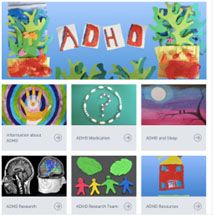Digital Transformation Projects
Attention Deficit Hyperactivity Disorder (ADHD) is the commonest c ondition in Child and Adolescent Mental Health services (CAMHS) in Ireland, occurring in 1-in-3 presentations. The importance of psychoeducation in the management of ADHD has been well established. Health consumers are increasingly turning to online resources as a source of information and despite variability in quality and reliability, families typically use the internet as their main source of information about ADHD.
ondition in Child and Adolescent Mental Health services (CAMHS) in Ireland, occurring in 1-in-3 presentations. The importance of psychoeducation in the management of ADHD has been well established. Health consumers are increasingly turning to online resources as a source of information and despite variability in quality and reliability, families typically use the internet as their main source of information about ADHD.
Mental health professionals in ADMiRE, Ireland’s first public specialist service for children and adolescents with ADHD, developed an online psychoeducational package including current, evidence-based information about ADHD and reliable online/published resources. This was previously evaluated in 2020/2021 by circulating to all families attending ADMiRE and to all members of ADHD Ireland (Ireland’s largest ADHD advocacy group).
The ADMiRE website provides a reliable, validated, user-friendly source of information about ADHD. Since the initial launch of the website, it has been used regularly for ADHD psychoeducation in the ADMiRE service, and has recently been used by a number of CAMHS teams and general practitioners nationally.
The aim of the current study is to update and evaluate a reliable, specialist-verified, up-to-date source of online information about ADHD. We are particularly interested in the evaluation of key stakeholders; mental health professionals, families (parents and young people), educators and those working in primary care services (e.g. GPs, Disability services, Primary care SLT / OT / Psychology). In the first phase of the study, the ADMiRE psychoeducational website was updated between June and December 2022.
To evaluate the website, an anonymous online survey was developed in Qualtrics, a web-based survey tool. Evaluation will be completed in phases; with specialist clinicians targeted in the first data collection. The survey link will initially be sent to child and adolescent psychiatrists for feedback.
Once feedback from specialist clinicians has been evaluated and incorporated into the website, further surveys will be sent to clinicians nationally, families and educators.
Research Team: Orla Merrigan, Des O’Toole, Aileen Killeen, Niamh Sneyd, Dara Maher, Laura Darby, Jane McGrath
In Ireland, 1-in-3 young people (YP) in child mental-health services (CAMHS) have ADHD (HSE, 2013). Clinical assessment/management of ADHD varies widely across Irish CAMHS. There is an urgent need to optimize and standardise ADHD assessment/management protocols. The objective of this quality-improvement initiative was to use ‘design-thinking’ methods to improve ADHD services. Desig n-thinking is a process that encourages organisations to focus on the people they are creating for and leads to human-centred products, services, and processes.
n-thinking is a process that encourages organisations to focus on the people they are creating for and leads to human-centred products, services, and processes.
A design-thinking workshop was facilitated by experts from the Irish health service Digital Transformation & Innovation Team in November 2022, aiming to explore how technology could be used to optimise Irish healthcare services for YP with ADHD. Delegates were recruited nationally and were comprised of key stakeholders (parents of YP with ADHD, clinicians with expertise in ADHD and educators). Delegates were involved in design-thinking processes to develop ideas about optimal services for people with ADHD in Ireland.
 Twenty-eight delegates attended the design-thinki
Twenty-eight delegates attended the design-thinki ng workshop. Following detailed discussion about core difficu6ty To our knowledge this is the first Irish design-thinking workshop that explored how technology can be used to improve ADHD care in children and adolescents. Findings from the workshop have informed the development of a prototype online tool, which will be implemented and trialed in early-adopter clinical sites across the country. A follow-up design-thinking workshop will continue this iterative process and ensure optimal development of services to best meet the needs of all key stakeholders.
ng workshop. Following detailed discussion about core difficu6ty To our knowledge this is the first Irish design-thinking workshop that explored how technology can be used to improve ADHD care in children and adolescents. Findings from the workshop have informed the development of a prototype online tool, which will be implemented and trialed in early-adopter clinical sites across the country. A follow-up design-thinking workshop will continue this iterative process and ensure optimal development of services to best meet the needs of all key stakeholders.
Title of Research Project 

“ADMiRE ADHD” – A novel app to improve management of Attention Deficit Hyperactivity Disorder
Project Lead: Prof Jane McGrath, Associate Professor (Psychiatry), TCD and Consultant Child and Adolescent Psychiatrist in the Linn Dara Child and Adolescent Mental Health Services (CAMHS), HSE.
Collaborators: The project is supported by an ADHD Expert Advisory Group comprised of clinician specialists, as well as digital health and health research experts within the HSE, TCD and DCU.
Software Developer: Zendra Health Funders: Public Service Innovation Fund 2023, (Department of Public Expenditure, NDP Delivery and Reform)


What is the problem that the research project is aiming to solve?
In Ireland, one in three young people in child mental health services have ADHD. It is extremely important to treat ADHD effectively as untreated or poorly treated ADHD is associated with a raft of negative health and socio-economic outcomes. There are very effective medicines available to treat ADHD, which significantly reduces these negative outcomes and improve quality of life. Despite available effective treatment, ADHD is often poorly managed due to a lack of structured, evidence-based protocols in clinical services. One of the biggest concerns is that children who are on ADHD medication in Ireland are not always monitored as well as they should be. This means that ADHD medicines are not always as effective as they could be, nor as safe as they should be.
The current solution to this is ADMiRE, a paper-based protocol for the assessment and treatment of children with ADHD. While it has proved very successful in terms of clinical outcomes and service user satisfaction, the paper system is administratively intensive for clinicians, limiting for adhering to required physical health monitoring, and it is difficult to collect quality data from parents, guardians, and teachers.
The ADMiRE ADHD App will be a secure, web-based app that will translate the ADMiRE standardised clinical protocol into one comprehensive digital system for optimal assessment and treatment of young people with ADHD. As such, the project will deliver significant benefits to CAMHS services and, by extension, the care offered to young people. The increased efficiency that will result from use of the app is estimated has the capacity to reduce wait times, increased capacity and reduced service costs.
Through automated online requests to parents, guardians and teachers, there will be a significant improvement in the quality and accuracy of reporting in between clinic visits. At such visits, clinicians will be supported through online prompts that deliver a comprehensive, evidence-based clinical review for treatment of ADHD. Complimenting this, pre-programmed ‘red flags’ will also alert clinicians to risks identified by the data analysis supported by the platform.
